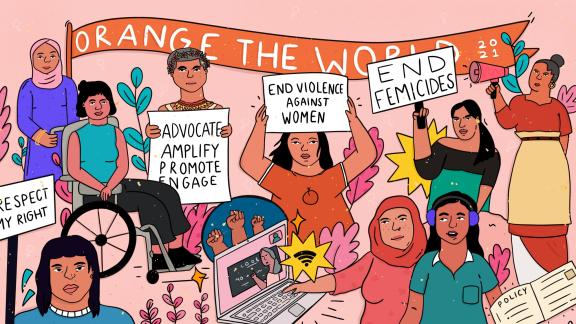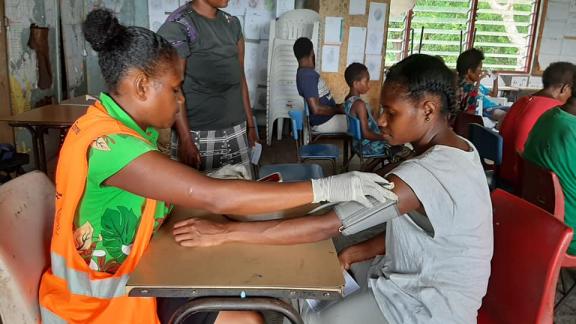On the 10th of December 2021, IPPF ESEAOR and Asia Safe Abortion Partnership (ASAP) organized a panel discussion about online activities and SRHR in Asia. Advocates and experts for GBV in online spaces shared their experiences and key methods during their presentations and Q&A session.
This dialogue highlighted the importance of establishing safe online spaces for citizens, civil societies, and human rights activists to develop GBV issues in Asia. Especially, under the COVID-19 pandemic, more abusive reactions in the digital spaces have been observed as the demands for online activities have risen. The international and domestic governance teams should take immediate and effective actions for securing safe online spaces for everyone.
Nandhini Mazumder, Assistant Coordinator at ASAP gave the opening presentation highlighting the online GBV issues enabled by the AI algorithm, privacy, surveillance, and censorship.

The event was divided into two-panel discussions. The first panel focused on the experiences of managing digital spaces, such as tele-helplines, social media accounts and online activism. It was facilitated by Natassha, Senior Advocacy Officer at IPPF ESEAOR. Each panelist brought a unique experience and innovative ideas to navigate gender spaces online. Our first panelist, Kris Anne, an active IPPF Youth Volunteer, Family Planning Organisations of Philippines (FPOP). She is a trained peer educator and as well as a trained Community-Based Screening Motivator. She emphasized the role of the internet as an SRHR advocacy tool against GBV. She talked about Your Hotline, an online hotline through social media (FB), which contributed to creating safe spaces. Despite the challenges, they are working on building their digital security and pushing for gender-sensitive packages. The second panelist, Amalia from Women on Web has been involved in many research and advocacy projects on SRHR. She has also been an active member of PurpleCode Collective, a collective working towards a feminist internet. Amalia talked about building online solidarity spaces. Through this, we can strengthen collaborative actions and challenge the adversaries together with the government, civil society, and big tech companies.

Our third panelist, Pushpa Joshi, a co-founder of YoSHAN Nepal is working on multiple SRHR activities digitally. An advent advocate of legalizing sex work in Nepal, Pushpa is working day and night against the rising sexism and hate speech in online spaces. To tackle this, they are collectively working to curb misinformation and share correct information about SRHR. Our final panelist, Noval Auliady from Jakarta Feminist has created the carilayanan.com as a cyber-based response to SGBV (Sexual and Gender-Based Violence) in Indonesia. While sharing his motivation to create this platform, Noval said, “We recognize that people live with their perpetrators. We give them options to access help safely.” He further emphasized the power of youth people and our actions, “Don’t stop talking, tweeting, and posting!”

The second panel was an expert discussion facilitated by Ayesha Bashir, ASAP who interviewed Kirthi Jayakumar to discuss the larger issues of the role of feminist movements, the challenges we face to build safe spaces online and how can we use technology to empower ourselves. Kirthi Jayakumar is a lawyer and feminist researcher. She founded The Gender Security Project, a digital repository on the WPS Agenda and Conflict-related Sexual Violence. She coded Saahas, a mobile app and chatbot to help survivors of gender-based violence find help across 196 countries, and to enable bystander intervention. Kirthi eloquently described the issues we as feminists face while accessing technologies. She also discussed in detail the patriarchal structures that make online spaces rigid, unaccountable, and inaccessible to women and gender non-conforming individuals. She inspired us to not give up and to identify the role of technology to visibilise ourselves and feminize online spaces. In her words, “there is power in numbers. We must get our voice heard while we celebrate our own differences.” She added, “technologies have the power to empower, however, we also need to develop education, regulation, and legal systems for safer online spaces.”
In her closing remarks, Dr. Suchitra Dalvie, co-founder of ASAP, fueled our activism by adding, “Tomorrow is already here and if we want to lead the conversation around the issues, we care about deeply we have a responsibility to understand the shifting and blurring of issues that are core to our work.”

Banner illustration by Shreya Tingal.
Graphic recordings by Claudine Delfin.
when









